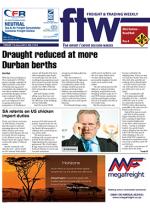While the industry
acknowledges the need for
a modal shift from road
to rail – particularly for
bulk cargo – there are still
serious concerns around the
efficiency of rail.
“Convincing customers
that railways are efficient is a
key challenge in effecting the
modal shift, particularly as
railway operations have been
left to fall into disrepair over
the past few decades,” said
Lindiwe Dlamini, minister of
public works and transport
for Swaziland, speaking at the
Southern African Railways
Association (Sara) conference
held in Johannesburg late last
month.
Thsenolo Mabeo,
minister of transport and
communications for Botswana,
echoed Dlamini’s sentiments,
commenting that railway
operators and administrators
needed to find ways to ensure
they met customer demands,
creating a culture of “proactive
responsiveness”.
He added that governments
needed to invest further in rail,
not only to develop the muchneeded
infrastructure and
purchase equipment, but to
ensure ongoing maintenance
and upgrades. “This would
also send a message to
prospective customers that
there was commitment to
efficiency and safety,” said
Mabeo.
Swaziland Railway CEO,
Stephenson Ngubane,
commented to FTW on the
sidelines of the conference
that government investment
in railways would mean more
value for customers. “Wellmaintained
infrastructure
and equipment means better
delivery times and makes the
movement of cargo that much
more cost-effective,” he said.
He added that although
railways were owned, or partowned,
by governments in
many SADC countries, they
needed to conduct business
on a commercial basis.
Nelson Nyangu, director
general of transport for
Zambia’s ministry of
transport, pointed out that
countries needed to work
together to ensure efficiency.
“Movement of goods
transcends borders and it is
therefore vitally important
to improve rail connectivity
between countries and
establish regional integration
on systems and standards,”
he said.
INSERT & CAPTION
Convincing customers
that railways are
efficient is a key
challenge in effecting
the modal shift.
– Lindiwe Dlamini

